The interchangeability of motor oils is of interest to car owners from a practical point of view: gasoline needs to be bought, and diesel can be obtained from familiar workers of large transport enterprises. But whether it is suitable for a carburetor engine, many do not know.
There are big differences in power plants, therefore, lubricants also have unequal characteristics, which relate primarily to additives. There is no definite answer to the question of the possibility of pouring diesel oil into a gasoline engine; many factors should be taken into account.
1 Differences in oils for different types of engines
All motor lubricants have two components: a common base and various additive packages. Their composition is selected taking into account the type of internal combustion engine, operating conditions, priority tasks. Diesel fuel (DF) contains much more sulfur than gasoline. It oxidizes during combustion and saturates the engine oil.
During the operation of the engine, high compression is created to ignite the diesel fuel, gases break through into the sump. To reduce the negative impact of these factors, appropriate additives are selected.
A way to find out why CHECK is on!
Main difference
Diesel oil retains its lubricating properties for quite a long time, but it quickly oxidizes under the influence of combustion products of diesel fuel. So that the characteristics do not decrease for a longer time, additives are added to it.
For a diesel plant, the main problems are increased fuel contamination, the formation of oxides and gas breakthrough into the oil pan. Therefore, the lubricant must provide flushing of the crank mechanism and the cylinder-piston group (CPG), and be resistant to oxidation. Special binding and detergent additives are added to it.
An important role is played by alkali, which reacts with acids and neutralizes them. It has a good cleaning effect, softens carbon deposits and soot, washes them off the surface. Its amount is twice as much as in a lubricant for a carburetor engine. This is the main indicator by which diesel oil differs from gasoline.
The components are selected more precisely than for a carburetor or injector, but a higher content increases the ash content. When working with them, chemical reactions occur, compounds appear that settle on the internal surfaces of the motor. The more additives in the composition, the greater the pollution. Operating conditions lead to a reduction in service life, replacement is made more often compared to gasoline.
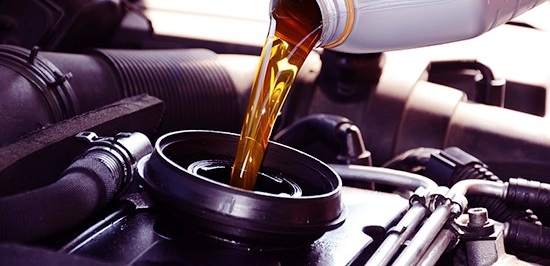
For carbureted engines, it is more important to ensure high-quality lubrication of rubbing parts, since the engine develops high speeds. Gasoline oil does not need alkali, which is present in diesel oil - the fuel used is much cleaner than diesel fuel, burns more completely, and almost does not oxidize.
According to experts, the less various additional components are present in the oil, the better the motor works. Pure gasoline contains no more than 5% of them, they have the same protective properties, but are focused on a different aggressive environment. Few insoluble deposits form in the engine.
The difference in motor lubricant for a truck and passenger diesel
The differences are not as significant as between those designed for different types of engines, but they are present. Power plants differ in their characteristics - in cars they are more high-speed. The oil suitable for them contains more additives that provide good lubrication of rubbing parts, but it is changed more often.
IT IS IMPORTANT TO KNOW!
Every motorist should have such a universal device for diagnosing his car. Now without an autoscanner it's just nowhere!
You can read, reset, analyze all sensors and configure the car's on-board computer yourself using a special scanner ...
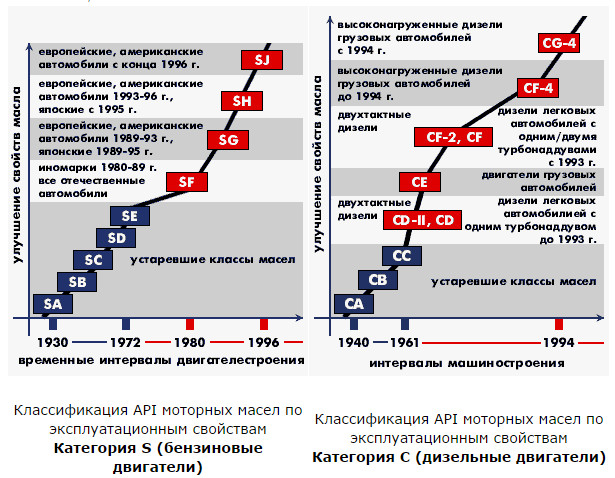
In the engines of trucks with a significant volume, a lot of oxides and soot are formed. This affects the additive package, which contains an increased amount of alkali for cleaning and neutralization, and there are no components for high speeds in the composition.
The interval between replacements is longer. The main emphasis is not on speed, but on strength, that is, the degree of compression. To withstand such loads, additives contain a lot of alkali, aggressive components that hold ash and soot. Even the testing of truck oil is done differently, its properties are very different from other lubricants.
Universal oils
For different types of power units, motor compounds are produced that differ in the package of additives. For large fleets, this creates certain inconveniences, since there are trucks and cars, diesel and gasoline.
This problem is solved by universal oil, which can be poured into any engine. The basis for all varieties is the same, and wide application is ensured by carefully selected and balanced additives. The composition is verified according to exact formulas, where everything is perfectly calculated.
Fine tuning gives good results in any mode of operation, carbon deposits, soot are removed, the surface is washed, and oxidation products are removed. Components neutralize processes that are equally inherent in engines of different types. The list of additives often contains those with increased alkalinity and ash content.
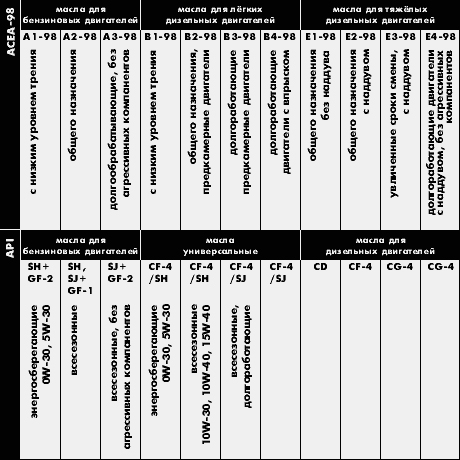 European and American classification of oils
European and American classification of oils
A lubricant made by well-known manufacturers is much more expensive than conventional analogues. Compared to pure gasoline, the difference reaches 50-70 percent. Universal oil has only a synthetic base.
It affects the engine not narrowly, but in a complex way:
- has antifriction effect;
- resists oxidation processes on the metal;
- removes undesirable products formed during operation into the filter.
The oil in a diesel engine reacts to the quality of the fuel to a greater extent than that poured into gasoline units. Universal grease provides for the use of only well-cleaned diesel fuel, the amount of sulfur in which is strictly limited. If you are not sure about this, it is recommended to refrain from using it.
Many car manufacturers have a negative attitude towards the use of universal oils. High-quality gasoline, which are rare, provide longer engine life. They differ in that they contain a minimum amount of additives, and together with good gasoline they give an excellent effect.
2 Diesel and carburetor engines
The types of engines differ greatly in the principle of operation. This applies to:
- method of igniting the air-fuel mixture;
- compression ratio;
- susceptibility to overheating;
- the number of turnovers developed.
The ongoing processes have a pronounced difference. Discrepancies are also present in the lubricant, so the requirements for oils are not the same.
Diesel Features
The ignition of fuel in cylinders is fundamentally different from that used in gasoline engines. This is where all the consequences come from. Fuel with air ignite on their own from strong compression, and not from a third-party spark discharge. Very high compression is required, which is twice as high as that created in injection and carbureted cars.
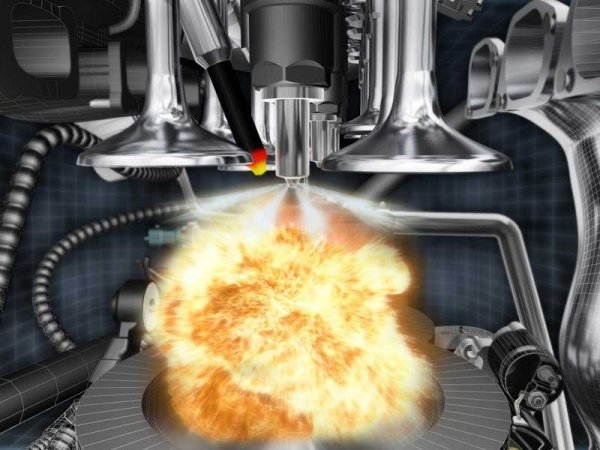
Mixture formation and combustion in diesel engines occur much faster, so the parts of the power unit are constantly experiencing increased loads. Harsh conditions are potentially hazardous by overheating. The motor does not develop high speeds, the main task is to get a large output torque. The very comparison of the capacities of devices of different types indicates serious differences in operation.
Oxides and unnecessary deposits are intensively formed, which settle on the parts and enter the lubricant, reducing its characteristics. The process is called:
- Mode of operation under high pressure, temperature, loads. Oxidation occurs faster than in gasoline engines. Diesel fuel does not burn completely, soot, soot is formed.
- Breaking into the crankcase from high compression gases, vapors. They are mixed with oil, its properties are gradually lost.
- Undesirable impurities contained in diesel fuel. It refers to oil products of a lower fraction, and the percentage of their content significantly exceeds the amount in gasoline. Sulfur and other substances are converted into oxides and acids, which are very aggressive towards other compounds present in the engine.
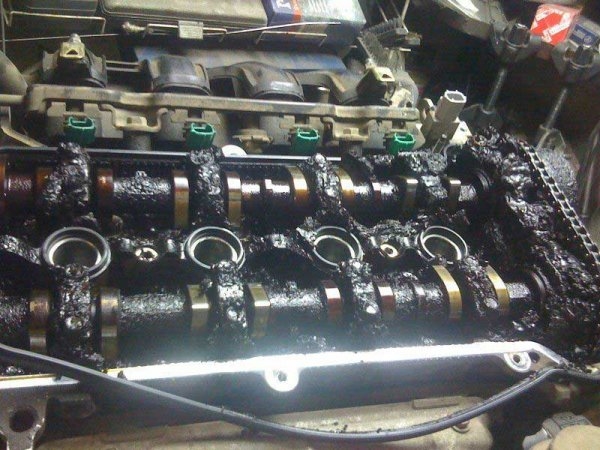
All factors determine completely different operating conditions for a diesel engine; it requires a special approach. Reducing the friction of parts is only one of the functions of the oil. This is taken into account, additional components are introduced into the lubricant, which ensure the correct functioning of such motors. They neutralize the elements of oxidation, fight carbon deposits, deposits.
Petrol power unit
If we compare the compression in the combustion chamber, then in diesel engines it is much higher. The result is lower operating temperatures. Turbocharged engines have a problem with heating up in winter, which is why they are called cold-blooded. To achieve optimal torque, the motors are made high-speed (up to 9 thousand, and after tuning, 10-12).
The mixture is ignited by a spark from a spark plug. This allows the fuel to burn faster and almost completely. The amount of residual products is less than from diesel fuel.
It may seem that a gasoline engine with its high speed requires a thinner oil. This is not entirely true, in terms of viscosity, motor lubricants of different types are comparable, a number of additives in them are identical. They create a strong protective film on the surface of the parts. Only alkaline compounds in diesel oil are much larger.
3 They poured the wrong oil into a gasoline engine - what will happen?
You should immediately discard the categorical judgment that this should never be done. The arguments of the supporters of this opinion seem to be correct: different types of lubricants, operating conditions and operation of motors, additives are different. But the practical experience of many motorists says that there will be no serious consequences if diesel grease is poured into a gasoline engine.
Take into account the nuances, the most important of which are:
- diesel oil type;
- engine deterioration;
- duration of use of the filled lubricant;
- driving style.
Clarifying the first point, you should know that if the oil is intended for trucks, it is not used. It is not suitable for all diesel engines, but even more so for gasoline units. It does not have components that allow you to work at high speeds. A significant percentage of alkali also has negative effects. Diesel compositions for passenger cars can be used, but engine output is taken into account.
If the rings and cylinders are worn, oil enters the combustion chamber. Another entry channel is through valve seals. In both cases deposits are formed. Consequences - glow ignition, detonation. The use of gasoline with a higher octane number eliminates undesirable phenomena.
If the CPG is normal, the consumption of oil material between replacements is small (up to one liter), then deposits are minimal or completely absent. In this case, you can fill in diesel working fluid. There is one caveat: it is not designed for high speeds. If you do not exceed 4.5 thousand, you can ride without fear of trouble.
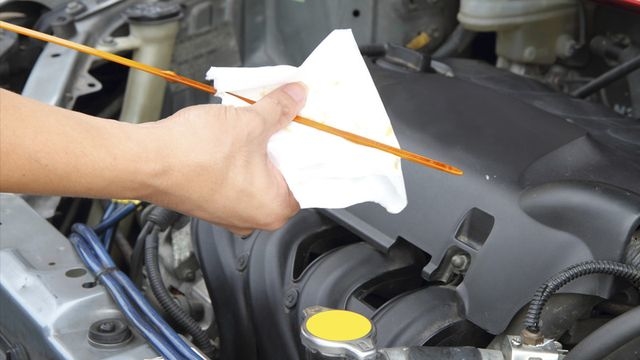
As a way out of an emergency situation, it is allowed to use any composition intended for diesel units. If there is no confidence in its quality, they are immediately drained as soon as possible, a new filter is installed, and the engine is washed. You can drive on good oil for quite a long time, but change it more often, after running half the resource.
In diesel oil, additives are up to 15%, in gasoline - only 5. Therefore, antioxidant and detergent properties are better. Car owners who risked this claim that the gas distribution mechanism looks like a new one.
Much depends on the quality of the lubricant. Low-grade, no matter what type of engine it is suitable for, does its job poorly, does a lot of harm. If it is poured into a motor for which it is not intended, then very serious damage is possible. A good diesel oil will do less damage in a gasoline engine than a specially formulated but poor quality one.







